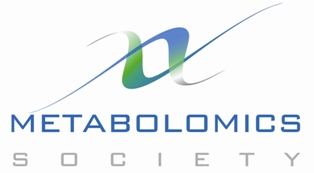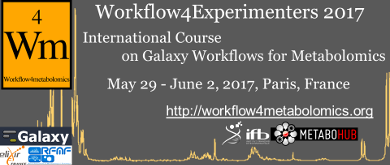
TMIC and the Metabolomics Society
Issue 67 - March 2017
CONTENTS:
Online version of this newsletter:
http://www.metabonews.ca/Mar2017/MetaboNews_Mar2017.htm

 |
| Published
in partnership between TMIC and the Metabolomics Society Issue 67 - March 2017 |
|
CONTENTS: |
|
|
 |
| TMIC
Services |
 |
Metabolomics Society News |

|
|
 |
| |
Metabolomics Spotlight
|

| |
MetaboInterview
|
| Associate
Professor of Molecular Toxicology at the
Pennsylvania State University, University Park,
Pennsylvania, USA |
|
 |
Biography Andrew Patterson is an Associate Professor of Molecular Toxicology at the Pennsylvania State University, University Park. The Patterson lab’s focus is on understanding the host-metabolite-microbiome axis—specifically how the manipulation of gut microbiota by xenobiotic exposure impacts metabolism, host metabolite pools like bile acids, and how these interactions are modulated by host nuclear receptors. The lab employs a variety of tools including 1H nuclear magnetic resonance spectroscopy, mass spectrometry and conventional and gnotobiotic mouse models to facilitate its study of these pathways and understand their potential impact on human health and disease. |
 |
Metabolomics
Current Contents
|
Metabolomics
Events
|
| 20 Feb
to 17 Mar 2017 |
Metabolomics Data Processing and Data Analysis Online Course An online course by the Birmingham Metabolomics Training Center, University of Birmingham, UK hosted by Futurelearn Venue: Birmingham Metabolomics Training Centre, University of Birmingham, Birmingham, UK This four-week online course will explore the tools and approaches that are used to process and analyse metabolomics data, we will investigate the challenges that are typically encountered in the analysis of metabolomics data and provide solutions to overcome these problems. The course will be delivered using a combination of short videos, articles, discussions, and online workshops with step-by-step instructions and test data sets. We will provide quizzes, polls and peer review exercises each week, so that you can review your learning throughout the course. The material will be delivered over a four week period, with an estimated learning time of four hours per week. If you do not have time to complete the course during the 4-week period you will retain access to the course material to revisit, as you are able. Registration fee: Early-bird £200, Standard £220 For further information and registration details, please visit http://www.birmingham.ac.uk/facilities/metabolomics-training-centre/courses/Metabolomics-Data-Processing-and-Data-Analysis.aspx or contact bmtc@contacts.bham.ac.uk. |
| 13-15
Mar 2017 |
CPSA Metabolomics 2017 Venue: The University of Florida Clinical & Translational Science Institute, Gainesville, Florida, USA 3rd Annual Metabolomics Symposium on Clinical and Pharmaceutical Solutions through Analysis (CPSA Metabolomics 2017) "LC-MRM assays targeting constant region peptides determine the type and isoform of the involved Ig and quantify its expression..." - Remily-Wood, ER; Benson, K; Baz, RC; et al. Proteomics Clin Appl. 2014 Oct;8(9-10):783-95. Personalized Metabolism The symposium session on Personalized Metabolism will highlight new technologies, approaches, and strategies of metabolomics in research, biopharma and the clinic. Congratulations to our Discussion Leaders, Don Chace of Medolac Laboratories and Emily Ehrenfeld of New Objective for organizing a wonderful session. Visit the recently updated program agenda to review the line-up of sessions and exciting events at this year's annual meeting!
Registration is open! Click on the CPSA Metabolomics 2017 registration link and register today! Travel & Accommodations Prepare now for your Travel & Accommodations for CPSA Metabolomics 2017. Make your hotel reservations at the Hilton University of Florida Conference Center. Reserve your room on-line or call the hotel directly (352-371-3600). For more information,
visit http://www.cpsa-metabolomics.com.
|
| 13-17
Mar 2017 |
Hands-on LC-MS for Metabolic Phenotyping Venue: Imperial College London, South Kensington, London, UK Description: This week long course aims to cover how to perform a metabolic profiling experiment, from start to finish. It covers study design, sample preparation, the use of mass spectrometry for global profiling and targeted methodologies and data analysis. It combines lectures and tutorial sessions to ensure a thorough understanding of the theory and practical applications. Topics covered include:
or contact Dr Liz Want (iptc@imperial.ac.uk) for further information. |
| 19 Apr
2017 |
Lifetime Exposures and Human Health: The Exposome Venue: Yale School of Public Health, Winslow Auditorium, LEPH, 60 College Street, New Haven, Connecticut, USA Drs. Caroline H. Johnson and Vasilis Vasiliou from the Department of Environmental Health Sciences at Yale School of Public Health will be hosting a one-day symposium on the Exposome. Speakers include: Dr. Gwen W. Collman (NIEHS), Dr. Dean P. Jones (Emory University), Dr. Chirag J. Patel (Harvard Medical School), Dr. Toby J. Athersuch (Imperial College London) and Dr. David F. Grant (University of Connecticut). Sponsorship from Waters Corporation. For more information and to reserve a seat please visit: http://publichealth.yale.edu/ehs/exposome/ |
| 11-13
May 2017 |
Metabolism in Time and Space: Emerging Links to Cellular and Developmental Programs Venue: EMBL Heidelberg, Germany T. Alexandrov, A. Aulehla, P. Dorrestein, O. Leyser, S. McKnight, N. Perrimon Deadlines
Topics
Latest News
Stay up to date! Add
this event easily to
your calendar by
downloading the
iCal>>
Add
to calendar For more information,
visit http://www.embo-embl-symposia.org/symposia/2017/EES17-01/index.html
|
| 17-18
May 2017 |
Conference on Food and Nutritional Metabolomics for Health Venue: The Ohio State University, Columbus, OH, USA The purpose of this two-day event is to disseminate state-of-the-art knowledge in the field of food and nutritional metabolomics and foster networking and collaboration among colleagues and industry partners. For more information please visit: https://discovery.osu.edu/focus-areas/foods-for-health/events/conference-2017.html. |
| 29 May
to 2 June 2017 |
W4E2017 Course: Analyze your LCMS, GCMS and NMR data with Galaxy and the Workflow4Metabolomics e-infrastructure Venue: Paris, France  The next Workflow4Experimenters international course (W4E2017) will take place in Paris (May 29 to June 2, 2017). During this one-week course (entirely in English), you will learn how to use Galaxy and the W4M infrastructure to analyze your own LC-MS, GC-MS, or NMR data set. Morning sessions will be dedicated to methodology and tools. Afternoon sessions will be devoted to tutoring. Invited speakers: Tim Ebbels (Imperial College), Steffen Neumann (IPB Halle), and Ralf Weber (Birmingham University). Registrations: http://workflow4metabolomics.org Contact: contact@workflow4metabolomics.org |
| 26-29
June
2017 |
Metabolomics 2017 Venue: Brisbane, Australia  It is our pleasure to invite you to the 13th International Conference of the Metabolomics Society from 25-29th June, 2017 at the Brisbane Conference and Exhibition Centre (BCEC) in Brisbane, Australia. Brisbane is a vibrant, friendly, lifestyle city—home to leading medical research and a thriving industry hub, located in the heart of Australia’s premier tourist region. The BCEC is rated among the top three convention centres in the world, and was the venue of the 2014 G20 Leaders Summit. It is ideally located in the unique riverside cultural and lifestyle precinct at South Bank, which is an inner city oasis with riverfront parkland, rainforest pockets and Australia’s only city-based sand and swimming beach as well as Australia’s newest and largest Gallery of Modern Art, cafes, restaurants and stylish shops. The conference has the theme of Building Bridges and under this banner extends its reach to the systems biology / genome-scale modelling community, as well as to the analytical chemistry / natural products chemistry community. In addition, the program features thematic streams for advancing the field, for food and environmental metabolomics, and for health and wellness. In addition, a deeper engagement between researchers within the Asia Pacific region is a natural focus for a conference held in Brisbane to promote metabolomics research, build and strengthen networks in the region. We invite you to attend an exciting scientific program comprising 27 oral sessions, 5 plenaries, 4 poster sessions, sponsored luncheons, as well as several keynote lectures and workshops. We will continue the successful tradition of satellite workshops to the conference in the afternoon of Sunday 25th June and the morning of Monday 26th June. Additionally, we have planned a range of social activities, including a welcome reception, an early-career researcher mixer and a conference dinner in the iconic BCEC Plaza Ballroom to give you a true Aussie-style experience. Brisbane is the ideal opportunity for delegates to enjoy a microcosm of Australia’s iconic experiences. World heritage listed rainforests, amazing beaches, islands, wineries and the internationally famous Australia Zoo—home of the crocodile hunter—are all easily accessible within an hour of the city. You can even do day trips to the Barrier Reef from Brisbane. On behalf of the Local Organising Committee and the Metabolomics Society Board we are excited to once again invite you to Metabolomics 2017—we are looking forward to welcoming you down under! Prof. Melissa Fitzgerald, School of Agriculture and Food Sciences & Dr. Horst Joachim Schirra, Centre for Advanced Imaging, The University of Queensland, Brisbane, Australia For more information, visit http://metabolomics2017.org/. |
| 2-5
Jul 2017 |
28th Pharmaceutical and Biomedical Analysis Conference (PBA 2017) Venue: San Pablo CEU University, Madrid, Spain It is our great pleasure to invite you to the 28th Pharmaceutical and Biomedical Analysis Conference (PBA 2017) that will take place in MADRID at San Pablo CEU University on 2-5 July 2017. The conference will cover all aspects of pharmaceutical and biomedical analysis, with particular emphasis on bringing Pharma industry to meet Academia. Key representatives in all areas of PHARMA INDUSTRY: R&D and quality control, both for small molecules and biopharmaceuticals will be invited to present their developments and pending challenges. In addition, as would be expected, “omics” methodologies, especially METABOLOMICS, will occupy a special place. The purpose of PBA 2017 is to bring together people from Industry, Universities, Control Laboratories and Hospitals to discuss the current status of analytical techniques including instrumental applications and theoretical developments. Plenary and Keynote Lectures will be given by internationally recognized invited speakers. An attractive program of social events will also be arranged during the symposium. For further information, visit https://www.regonline.com/builder/site/Default.aspx?EventID=1890431. |
| 16-21
Jul 2017 |
2017 UAB Metabolomics Workshop Venue: Birmingham, Alabama, USA The 2017 UAB Metabolomics Workshop will be held July 16-21 in Birmingham, Alabama. There will be slots for 40 attendees. We particularly encourage graduate students and postdoctoral and clinical fellows. Those at US universities and institutes may qualify for support from NIH funding. We also encourage applications from all levels of faculty and other research personnel as well as all genders and ethnicities. The themes in this 5th year of the workshop are:
|
| 25-27
Sep 2017 |
MOVISS: Bio and Data Venue: Vorau, Austria A problem driven meeting aimed at bioinformaticians, biochemists, statisticians and those who handle and interpret metabolomics data When: Sept 25-27 2017 Where: Vorau, Austria To register and for more information, go to www.MOVISS.eu, and follow us on Twitter @MOVISSmeet Not just an ordinary conference, where people present work they have already done, MOVISS is centered on identifying and problem solving current challenges relating to metabolomics data handling by getting everyone in the room discussing it. Want to be at the forefront of solving some of the major bottlenecks in the Metabolomics Revolution – see you at MOVISS! |
| 11-13
Dec 2017 |
MetaboMeeting 2017 Venue: University of Birmingham, UK Make plans to attend the 10th successful MetaboMeeting conference. The meeting will bring together research scientists and practitioners from all areas of application and development of metabolic profiling, covering a wide range of experience from early career scientists to experts from throughout the international metabolomics field. MetaboMeeting 2017 continues to highlight the work of its attendees through both oral platform presentation and poster sessions. The deadline for oral presentation abstracts is 15th July 2017. The deadline for poster abstracts is 1st October 2017. For further information, visit http://metabomeeting2017.thempf.org/. |
Metabolomics Jobs |
This is a resource
for advertising positions in
metabolomics. If you have a job
you would like posted in this
newsletter, please email Ian
Forsythe (metabolomics.innovation@gmail.com).
Job postings will be carried for
a maximum of four issues (eight
weeks) unless the position is
filled prior to that date.
Jobs Offered
| Job Title | Employer | Location | Posted | Closes | Source |
|---|---|---|---|---|---|
| Experimental
Officer (NMR Metabolomics)
- 47461 |
University of Birmingham | Birmingham,
UK |
27-Feb-2017 | 19-Mar-2017 |
University of Birmingham |
| Experimental
Officer in
Bioinformatics/Biostatistics
- 47322 |
University of Birmingham | Birmingham, UK | 27-Feb-2017 | 19-Mar-2017 | University of Birmingham |
| One year
postdoctoral position in
HR-MAS NMR-based
metabolomics |
CEA-Saclay | Gif-sur-Yvette, France | 24-Feb-2017 | CEA-Saclay | |
| Postdoctoral
Position in Metabolomics |
Georgetown University Medical Center | Washington,
DC, USA |
8-Feb-2017 | Georgetown University Medical Center | |
| Bioinformatician |
University of Alberta | Edmonton, Canada | 8-Feb-2017 | University of Alberta | |
| Biostatistician | University of Alberta | Edmonton, Canada | 8-Feb-2017 | University of Alberta | |
| Senior
Researcher Position in
NMR-Based Metabolomics |
Ohio State University | Columbus,
Ohio,
USA |
8-Feb-2017 | Ohio State University |
|
Ian J. Forsythe Double AB, MSc Editor, MetaboNews Department
of Computing Science
University of Alberta 221 Athabasca Hall Edmonton, AB, T6G 2E8, Canada Email: metabolomics.innovation@gmail.com Website: http://www.metabonews.ca LinkedIn: https://ca.linkedin.com/in/ian-forsythe-465512128 Twitter: http://twitter.com/MetaboNews Google+: https://plus.google.com/118323357793551595134 Facebook: http://www.facebook.com/metabonews |
This
newsletter is published
in partnership between
The Metabolomics
Innovation Centre
(TMIC, http://www.metabolomicscentre.ca/)
and the Metabolomics
Society (http://www.metabolomicssociety.org)
for the benefit of the
worldwide metabolomics
community.
|